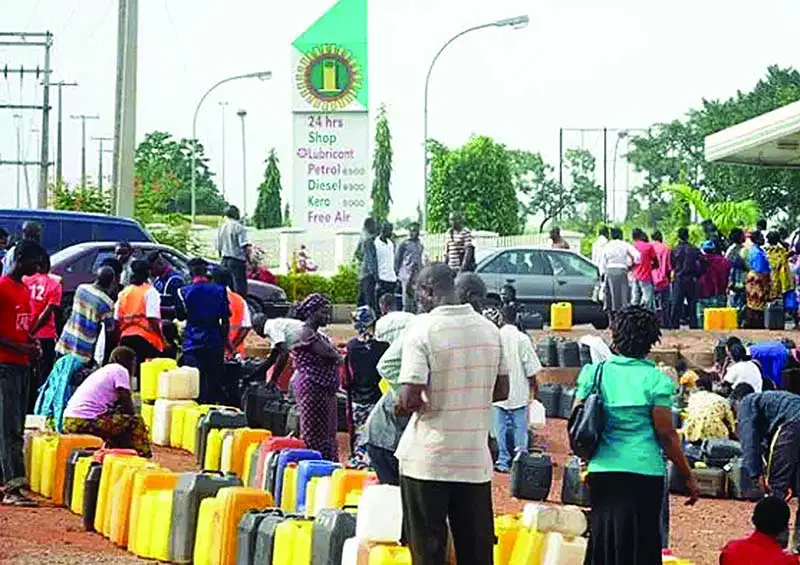
By Dele SobowalNapoleon Bonaparte once said, “An army marches on its stomach.” This quote rings painfully true in Nigeria today, where millions are suffering from hunger, unable to move forward in life as they struggle to survive. The current situation goes beyond food scarcity and high prices—it’s the lack of everything that sustains modern life. Fuel remains scarce, with no end in sight. Meanwhile, the Minister of Power can barely generate 4,000MW a day, and the Central Bank of Nigeria, after initial attempts to stabilize the exchange rate, seems to have lost its way.
It’s like the country has forgotten about “Renewed Hope,” the once-touted promise of prosperity. As predicted in December 2023 by Vanguard Newspaper, the shortages we are facing were foreseen. Now, these harsh realities are inescapable. For me, the most urgent concern is food, so let me share a heart-wrenching story from the Weekend Trust. It’s written by Dr. Fatima Damagun, in an article titled “Nigeria’s Hunger Crisis.”
Initially, I almost skipped the article—what more could be said about hunger? But Dr. Damagun’s writing is compelling. She shared a story that shook me to my core. It details the life of a woman who, when she cannot afford rice or tuwo, treks to nearby villages to gather a wild plant called Tafasa (Senna tora). This weed, found in the tropics, is prepared as a salad by mixing it with oil, seasoning cubes, and pepper. Those who have eaten it say no amount of seasoning can mask its foul taste. It’s consumed only to stave off hunger.
The fact that this plant is now being sold for N200 per bowl shows just how desperate people are. It’s frightening to think that so many are turning to such measures. How many Nigerians are now resorting to eating from trash bins?
More Floods, More Hunger
On September 3, 2024, Vanguard reported on the impending flood disaster. The National Hydroelectric Power Producing Areas Development Commission (N-HYPPADEC) pleaded with the Federal Government to take action. They warned that severe flooding has already impacted Niger, Kebbi, and Benue states, with 634 communities and thousands of farmlands affected.
In addition to these warnings, other states like Yobe and Adamawa are facing flooding before water has even been released from the Lagdo Dam in Cameroon—an event that always leads to destruction. This means the worst food crisis is still ahead. The current drop in the price of perishable goods, such as tomatoes and peppers, might mislead some into thinking we’re improving. But in reality, the situation is deteriorating, and this year’s overall harvest could be the worst in a long time.
Time to Rethink Food Security
Governors and Presidents like to call for “all hands on deck.” But in reality, they only want to hear from yes-men, the sycophants who tell them they can do no wrong. The truth is often buried, and when it finally comes to light, it’s too late to fix the damage. Our biggest mistake right now is believing that simply giving farmers the inputs they need will solve our food crisis.
In truth, many states have provided tractors and fertilizers but are still dealing with banditry, floods, and drought. What good are harvesters when the crops are either destroyed by floods, withered by drought, or stolen by criminals? A new approach is needed, one that shifts agricultural activities to safer urban and suburban areas. Sadly, no one seems to be working on this.
Palliatives are not a long-term solution; they are a sign of failure. People need to be encouraged—and sometimes forced—to produce food, not given handouts.
Fuel Prices Soar
On the same day, Vanguard also reported the rise of fuel prices, with petrol prices nearing N1,405 per litre in some states. News outlets confirmed this price hike, reporting official prices ranging from N930 to N1,350 per litre. The confusion that followed reflects a government that has lost control of the situation.
The Federal Competition and Consumer Protection Commission (FCCPC) had just warned traders to reduce prices or face penalties. Yet, fuel prices skyrocketed beyond anything else in the market. Can FCCPC’s head, Mr. Tunji Bello, force the Nigerian National Petroleum Company Limited (NNPCL) to bring prices back down to N610? It seems highly unlikely.
One hotelier I know recently had to shut down his business because he could no longer afford the cost of running generators. With dwindling patronage and rising fuel prices, he retrenched all his staff and plans to convert the hotel into a residential building. “Let the tenants worry about buying fuel for their generators,” he said. And just like that, 20 people lost their jobs.
Power Illusions
Recently, there were reports claiming Nigeria hit 5,313MW in power generation for the first time in three years. But don’t be fooled into thinking this is progress. Once touted as the largest economy in Africa with a GDP of $510 billion, Nigeria’s economy has now shrunk to about $270 billion, putting us in fourth place. For comparison, South Africa generates 244,383 GWh of power, Egypt 209,677 GWh, Algeria 83,390 GWh, Morocco 42,561 GWh—and Nigeria, only 36,037 GWh. Another failure by the government.
Stay informed on the latest news and updates. Join our WhatsApp channel here: https://whatsapp.com/channel/0029VabITrvEAKW7DSkTfP